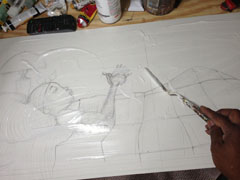Little Melba and her Big Trombone, is the story of Melba Liston, a little-known but trailblazing jazz musician who broke racial and gender barriers to become a famed trombonist and arranger. We asked illustrator Frank Morrison to take us behind the scenes for creating the art work used in Little Melba and her Big Trombone.
Illustration Process
- After reading the manuscript for Little Melba and her Big Trombone, I immediately searched for references that could help me bring the story to life. This included clothing from the time period and a trombone, which I have never painted before. I was fortunate enough to find a CD by Melba titled, “Melba Liston and her Bones” as well. After gathering all of my materials my studio begins to sound like a jazz session as I begin reading.
- I make thumbnails sketches and jot down notes on the sides of the manuscript while the Be Bopping is blaring from the speakers. My sketches are loose like a trombone’s slide and they take about a minute each.

- When the thumbnails are completed I being drawing defined sketches from them and at the same time placing them in page order. Sometimes I may have two or three different ideas for a page as shown in the cover sketches.


- Once my sketches are approved, I transfer the final drawings to an illustration board. This, of course, is done after I’ve measuring the dimensions and taped off the edges, which includes a half-inch border.

- I spray a fixative on the drawing so it won’t smudge then coat it with a clear gesso. Next I tape the image to a wooden board. The board allows me to work sitting down at my art table or placing the painting on my easel.

- Finally I use a lot of jazz music, dancing and oil paints to finish the final art.
Want to learn more about Little Melba and Her Big Trombone? Click here to get the scoop on all the research author Katheryn Russell-Brown did to write the book. Click here to listen to Frank’s Jazz music primer.











